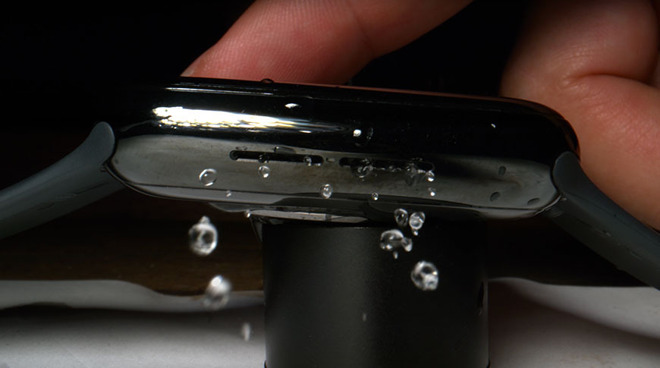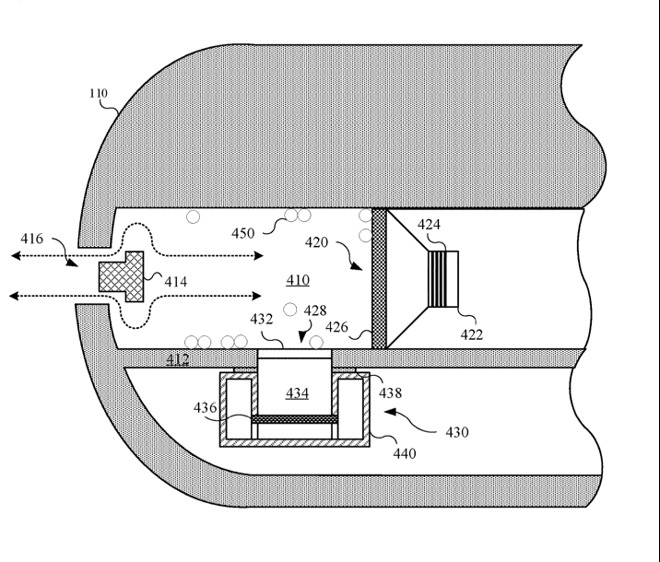Apple working on extending Apple Watch water ejection to iPhone, iPad
More Apple devices may gain the Apple Watch method of using speakers to push out unwanted water, and Apple is also researching the use of heat to evaporate moisture.

An Apple Watch ejecting water
The more complicated a system, the easier it is to break it. Apple's devices, especially the iPhone and Apple Watches, contain myriad sensitive components and so many of them can be wrecked by water that the company is continuing to pursue new ways of protecting them.
Apple has probably always thought about water proofing, but in 2015 it was revealed to be researching using silicon seals iPhones to protect them. If that worked, it presumably didn't work enough because in 2018, Apple was looking at another new sealing technology.
Yet Apple investigates many technologies and it was in 2016 that the Apple Watch Series 2 debuted with its water-ejection feature. Now the company is continuing its work on protecting devices from water -- or then removing water that is causing a problem -- with two new patents.
"Systems for increased drying of speaker and sensor components that are exposed to moisture," is the first of these two US Patents. It's concerned with having a frame for a device, a frame that contains sensors.
"[Cameras, GPS etc] functions suffer when the portable electronic device is exposed to moisture," says the patent. "Accordingly, there is a need to expedite removal of the moisture within internal cavities of the portable electronic device in order to quickly resume performing these user functions."
This patent actually seems to build on the Apple Watch system because it, too, relates "to systems that utilize a speaker to increase drying of an internal cavity of a portable electronic device previously exposed to moisture." It involves having a diaphragm that "is capable of actuating in response to [a] magnetic field," which is a speaker in all but name.
Apple is concerned with water getting into cavities, such as the ones within speaker grills, and where there is "an opening that extends into the cavity." These walls, the surrounding electronics of the device, "are capable of carrying operational components... where the sensor is capable of... determining moisture."
The patent then describes various methods of detecting water moisture, and how different materials need different systems. It's then concerned with how to get that water out of the system, and that's also the primary focus of the second patent.

Detail from the patent describing how a speaker system can be used to eject water
"Lid with embedded water detection and heater," the second patent, is about using pressure sensors. These can detect moisture and "facilitate its elimination."
"The micro-electro-mechanical system (MEMS) type pressure sensors used in smart phones or smart watches are generally capacitive-type pressure sensors," says Apple. "Pressure sensors using interim gel have been widely used in the microelectronic devices, but the gel can be susceptible to environmental contaminations and water occlusion."
So Apple's solution is to use a gel lid, covering at least part of a device, and then deploying electrodes around it. By "measuring a dielectric permittivity between at least two of the plurality of electrodes," the system can register that there is water present.
And then those same electrodes are "configured to eliminate the water via heat generation." Rather than pushing the water out, the heated element evaporates it instead.
The first patent is credited to five inventors, including Matthew A. Donarski, whose prior work includes a related patent concerning speaker diaphragms.
Three inventors credited on the lid patent, and those include Ashwin Balasubramanian, also known for working on a system to make iPhones function as emergency beacons.

An Apple Watch ejecting water
The more complicated a system, the easier it is to break it. Apple's devices, especially the iPhone and Apple Watches, contain myriad sensitive components and so many of them can be wrecked by water that the company is continuing to pursue new ways of protecting them.
Apple has probably always thought about water proofing, but in 2015 it was revealed to be researching using silicon seals iPhones to protect them. If that worked, it presumably didn't work enough because in 2018, Apple was looking at another new sealing technology.
Yet Apple investigates many technologies and it was in 2016 that the Apple Watch Series 2 debuted with its water-ejection feature. Now the company is continuing its work on protecting devices from water -- or then removing water that is causing a problem -- with two new patents.
"Systems for increased drying of speaker and sensor components that are exposed to moisture," is the first of these two US Patents. It's concerned with having a frame for a device, a frame that contains sensors.
"[Cameras, GPS etc] functions suffer when the portable electronic device is exposed to moisture," says the patent. "Accordingly, there is a need to expedite removal of the moisture within internal cavities of the portable electronic device in order to quickly resume performing these user functions."
This patent actually seems to build on the Apple Watch system because it, too, relates "to systems that utilize a speaker to increase drying of an internal cavity of a portable electronic device previously exposed to moisture." It involves having a diaphragm that "is capable of actuating in response to [a] magnetic field," which is a speaker in all but name.
Apple is concerned with water getting into cavities, such as the ones within speaker grills, and where there is "an opening that extends into the cavity." These walls, the surrounding electronics of the device, "are capable of carrying operational components... where the sensor is capable of... determining moisture."
The patent then describes various methods of detecting water moisture, and how different materials need different systems. It's then concerned with how to get that water out of the system, and that's also the primary focus of the second patent.

Detail from the patent describing how a speaker system can be used to eject water
"Lid with embedded water detection and heater," the second patent, is about using pressure sensors. These can detect moisture and "facilitate its elimination."
"The micro-electro-mechanical system (MEMS) type pressure sensors used in smart phones or smart watches are generally capacitive-type pressure sensors," says Apple. "Pressure sensors using interim gel have been widely used in the microelectronic devices, but the gel can be susceptible to environmental contaminations and water occlusion."
So Apple's solution is to use a gel lid, covering at least part of a device, and then deploying electrodes around it. By "measuring a dielectric permittivity between at least two of the plurality of electrodes," the system can register that there is water present.
And then those same electrodes are "configured to eliminate the water via heat generation." Rather than pushing the water out, the heated element evaporates it instead.
The first patent is credited to five inventors, including Matthew A. Donarski, whose prior work includes a related patent concerning speaker diaphragms.
Three inventors credited on the lid patent, and those include Ashwin Balasubramanian, also known for working on a system to make iPhones function as emergency beacons.


Comments